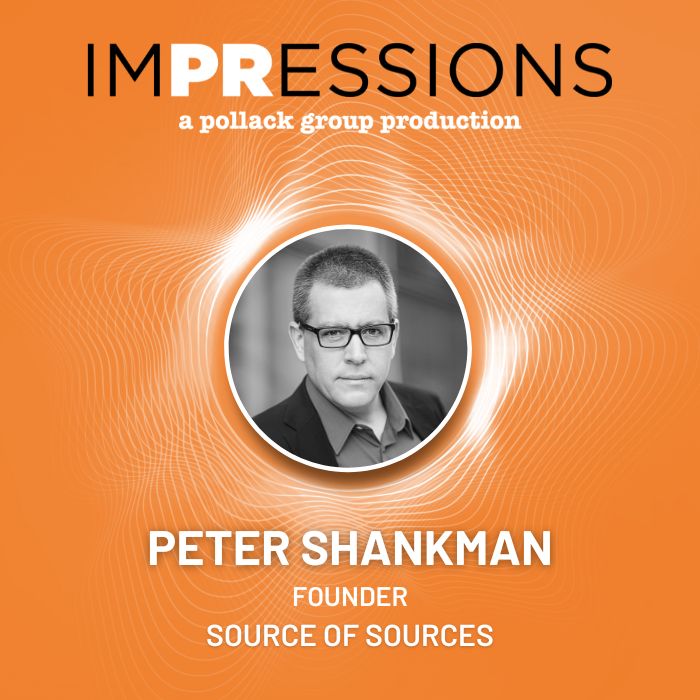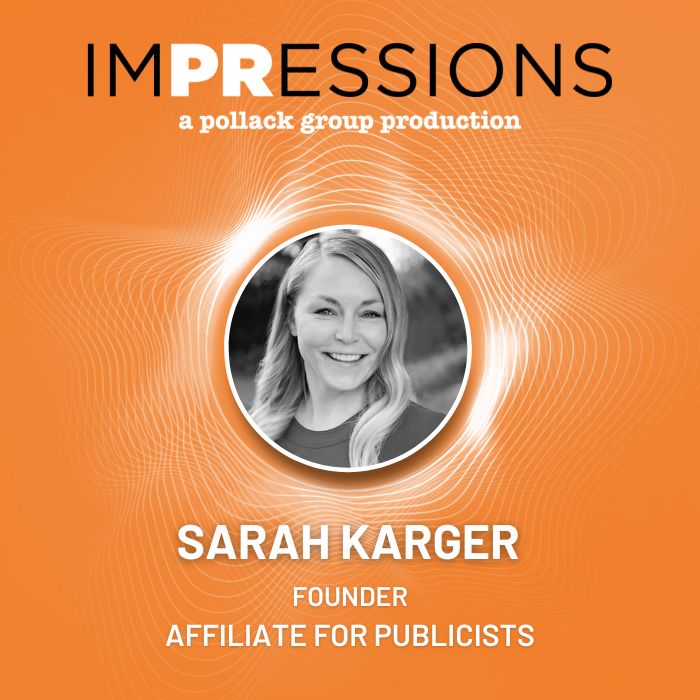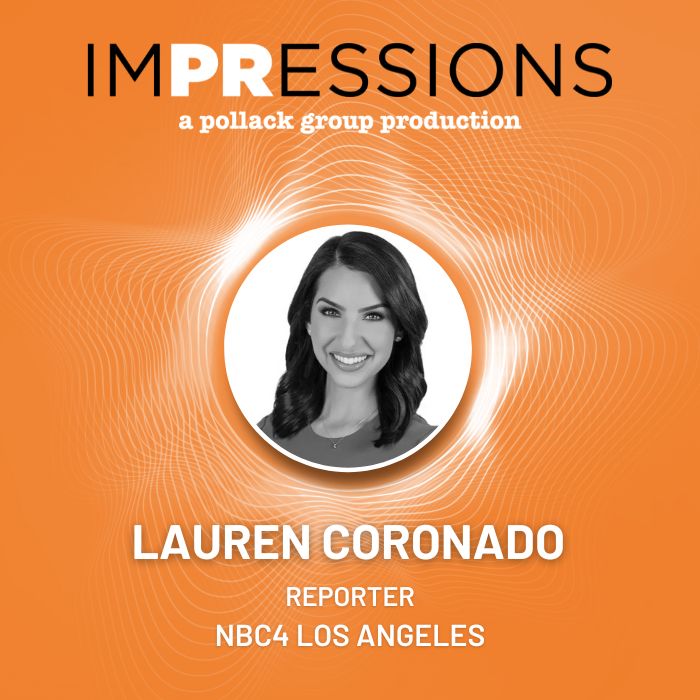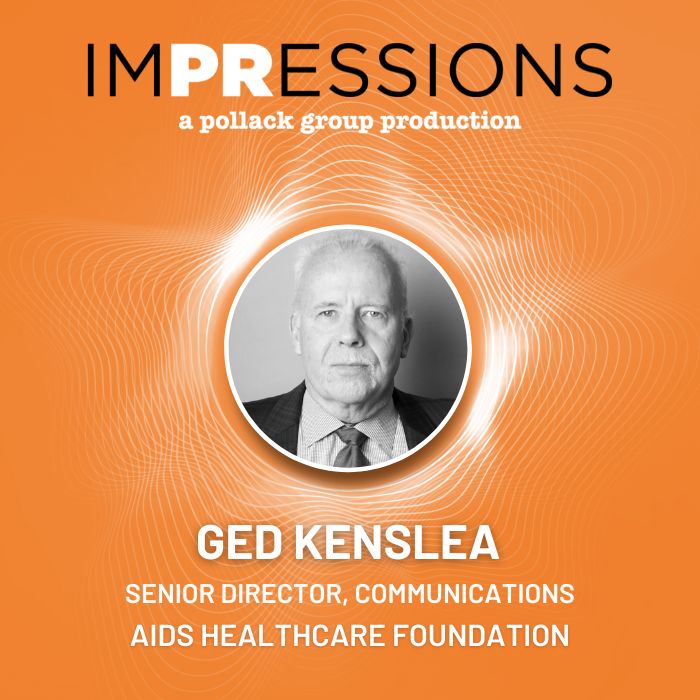
Kicking off 2025 with none other than Peter Shankman, the visionary behind HARO and his latest venture, SOS; an innovative tool every PR professional needs to connect with media and secure coverage. This week’s imPRessions episode covers Peter’s entrepreneurial journey and what PR professionals need to know about the evolving media landscape.
imPRessions Season 2 Episode #19 Transcript
Kalli: Hey, Jenn.
Jenn: Hello!
Kalli: So, Jenn, the question of the day today is, have you used HARO to “help a reporter out?”
Jenn: Yeah, I’ve actually used it both as a PR person and as a reporter.
Kalli: That’s awesome. I’ve only used it as a PR person, but I’d love to hear about your experience on the other side as a journalist.
Jenn: Yeah. So, you know, during Covid and a little bit after, I did some freelance writing, and I wrote for a coffee publication, and then I wrote for another publication that was very similar to BuzzFeed, but especially for the coffee publication, I had put in. If I had a specific topic that I was working on, I had put in to speak with coffee experts. And it’s very funny because being on the other side of the spectrum in the PR world, seeing some of the pitches that come through, some of them were fantastic, and I reached out to them and had some great conversations, and some of them were not even about coffee, except that I was like, this is I really, really feel sometimes for reporters what they go through because this is ridiculous. This has nothing to do with what I asked that side of it. It was helpful. But also, unfortunately, reporters have to kind of pick through the trash a little bit and which makes more work, and it’s just frustrating. But I got some great sources. And then the other one, I had been working on a podcast and, you know, needed sources for a couple of the stories I was working on and was in the horror industry, which was really cool. So I got a bite from a couple of people that they wrote for Netflix shows and stuff like that. So there are some legitimate people that are watching and really like answering some of these queries that come through, and you can really connect with some really interesting and important people.
So I absolutely love HARO. And then it became hero and now it’s SOS.
Kalli: I believe I’ve used it for almost my entire career. It was one of the first things that people once I was on the job and not in school anymore, that they told me to use. And, you know, I’d heard about it in school, but, you know, obviously didn’t really use it because it wasn’t really working with clients that were real, but it’s been such a helpful tool because one, it helps you as a student and just, you know, as a beginner learning what specifically some journalists are asking for and even like how to pitch them in a structure of like how to place and present a client or a story. To your point, there are some things that, you know, some of these reporters that aren’t real, or they were like, pay to play. So not exactly the best opportunity. But then there were some really, really great ones. And that sometimes was your only way to know that there’s, oh, there’s this perfect story that I wouldn’t have heard about or I wouldn’t have necessarily pitched because you just did it. No. And you’re really just hearing it directly from the horse’s mouth, what they need. And I think a lot of people in our industry on both sides have really found this platform to be so helpful and really amazing and a great way to connect in in a way that hadn’t been done before.
So I’m really excited to have our guest on today. It’s Peter Shankman, who is the man that made it all. And he’s going to talk to us a little bit today about SOS, which is his newest venture. We’ll learn more about it. I know I’m already subscribed, so it’ll be exciting to hear what he has in store.
Jenn: Amazing. I can’t wait to talk to him. Let’s get to it.
Kalli: For years, PR professionals have relied on HARO help a reporter out as an indispensable tool to connect with journalists and secure media coverage for their clients. It is revolutionized the way PR practitioners operate, providing a direct line to reporters looking for expert sources. On today’s episode, we’re thrilled to welcome its founder, renowned entrepreneur, keynote speaker and author Peter Shankman. Now he’s back with a new venture, S.O.S., and we can’t wait to dive into the details and hear more about what he’s been up to and what brought him to this exciting new adventure. Hi, Peter, thanks for joining us today.
Peter: My pleasure, guys. good to be here.
Jenn: So, I have used HARO for years. I think a lot of people in our industry have I know a lot of people at our agency have. I’d love to know a little bit more about your background and what influenced the development and launch of Harrow, which today is now currently SOS.
Peter: So, HARO still exists. It’s just not my company anymore. I sold HARO back in 2010 and several months ago, about 3 or 4 months ago, created something called source of sources. Journalists would constantly call me and say, hey, I’m doing a story on such and such. Who do you know? Over time, it got to be a little too much to answer. So I wound up creating help reporter out so I could email the queries to my friends. My friends became a couple hundred thousand people, and it was acquired by a company called Vocus back in June of 2010.
Jenn: So as you just said, you know, reporters would call and say, I need a source, I need commentary, I need XYZ. Can you tell us a little bit about your background as to how you became the go to person?
Peter: Sure. So I started my career running a PR firm. I was actually one of the founding editors of the Newsroom in America Online back in the 90s, left there and started a public relations agency called Geek Factory. And Geek Factory represented companies all over the world like Napster, Juno, AOL, all the dotcom darlings. And then sold that. I went to consulting and would constantly be in a plane and massively ADHD. If you’re sitting on a plane next to me, unless you fake your death, I don’t know everything about you by the time we get off the plane. So I created an incredibly large Rolodex, and reporters would call me and say, hey, I worked with you, and you ran that PR firm. I know you know everyone. I’m doing a story on whatever. Who do you know? And one thing led to another, and that’s how I launched. And then it was a lot of fun. It really shook up the industry. It blew up. I, um, built it into something major again. It was acquired after that. I spent several years consulting, having fun, and I just kept getting requests from people saying, hey, you know, you should start it again. I didn’t want to…didn’t want to. And eventually I decided, okay, maybe I should. And my girlfriend actually, sort of forced me to do it. So launched it, built it, and now we have something called SOS or Source of Sources, which is again, going back to the basics, the basics being connecting journalists with sources around the world to make both parties lives easier.
Kalli: That’s really amazing. And I have been following HARO for years. I don’t even remember a time without it, and it was one of the first things that when I started my first agency job, that everyone’s like, oh, you have to sign up for HARO. It was one of the first things that I did and that I learned about on the job. So really excited to see, you know, what? SOS. And how you bring this to life. So can you dive into a little bit more of what your primary goal is for launching SOS? What makes it a little bit different and taking it back to the basics. But if you could tell us a little bit more about that.
Peter: It’s my belief is that journalists have to do ten times more with five times less. And sources, especially small businesses, are constantly looking for ways to grow their business without spending a fortune. Something like SOS allows both things to happen simultaneously, easily and free. The reason I wanted to bring it back to basics is because when I ran the first company, it was very much about making sure that everyone was honest and stayed honest. You know, I don’t like when sources pitch off topic or when they talk about things when they’re lying. Whatever. I’ve heard rumors that there are other companies out there that do what I do, and they don’t really care so much about that. And so for me, that was very important. So this version is being crafted so that journalists are vetted and they’re known. We’re working with a company called Muckrack to make sure that journalists are who they say they are. And over time, we’re going to be able to do that for sources. Two sources will be able to be verified, maybe even have a score that rates them how good of a source they are. But either way, the goal is to make sure that everyone stays honest and fair. And this system works best for everyone.
Jenn: And we love Muckrack. We use it at our agency. And it’s it’s a great source. And that’s awesome that you’re partnering with them. I’d love to know a little bit more because like to talk a little bit about what you just said, how you have to make sure that the sources are legitimate, journalists are legitimate. SOS is a new version of what you originally founded. So what can PR people and journalists expect in terms of quality and the variety of opportunities? Are there any changes? And the second part of my question is, you know, because most of our listeners are in the PR field, what can they do to stand out? So if they’re answering a query from a journalist, like, what is something that will sort of separate them from the hundreds of other answers that their journalists are receiving?
Peter: The key is to be useful. The key is not to waste someone’s time. You know journalists when this when this email goes out, journalists get 50 queries in 30s. Right. So what can you do to make that better? How can you help the journalist be quicker with that? The answer is to create useful information for them.
Jenn: And what are the vast differences between S.O.S. and your original concept? HARO? Is there anything that is unique or different about this particular platform that people that are signing up should know about?
Peter: I can’t really comment on what the other company is doing. You know, I don’t own it anymore, but I can tell you that in mine, I am very involved. It’s a human being working it, you know, it’s not designed to upsell other products, whatever. For me, it’s very much just about building something to help people build their businesses or to help journalists write their stories. And as long as everyone who joins my network is honest about that and does their job correctly, it’s going to be a great place to be. And we’ve seen that already. We’re at over 20,000 members in just a couple of weeks or a couple of months.
Kalli: That’s so amazing. It is also not surprising knowing what the followers you had before. So I do want to talk a little bit about that. What strategies are you employing to attract both reporters and sources to SOS? Is there anything different that you’re doing that will help ensure a vibrant and active community that continues to remain this really beneficial and amazing tool?
Peter: Well, a lot of it comes from the fact that people know me and people trust me, and it also comes from the fact that I’ve been told in the past that I have no filter. And what that means is that if I find you misusing it, I have absolutely no problem calling you out in public, calling your agency out, and making sure that the world knows that you are not playing nice in the sandbox. You know, I have enough friends I have a daughter, I have a dog. My goal really is to make sure that what I’m building is used the right way and benefits people, and if it doesn’t, there is a pretty good chance that the world will know. At least the public relations world will know that you’re not doing the right thing. I got that I got that mindset from a guy named Chris Anderson, who was the editor-in-chief of Wired, who, back in 2004, called out 250 publicists for pitching completely off-topic or spam pitching and became this huge thing back then. Everyone was freaking out. I thought it was awesome because it was good to know we were ruining our industry, and we have only ourselves to blame. So do better.
Jenn: Yeah, I absolutely agree with that. And obviously for, you know, our listeners, it’s very important. And we talk about this constantly on the podcast. And we’ve been very lucky to have top tier journalists that come on that, that say the same thing, you know, and the media landscape today is also getting a lot smaller. We all see the massive layoffs that are happening at a lot of publications and news desks and things like that. So journalists are now doing double the work with less people. So, it’s really important to make sure that you are relevant and appropriate when you are pitching. And it’s also why something like SOS is so crucial for them to be able to get the sources and the information that they need on working on a deadline or a very important story. So truly, thank you for putting this together. And I think it’s helpful for PR people and it’s also helpful for the journalists. I know you talked a little bit about Muckrack and that partnership to be able to vet and make sure that it’s authentic, the journalists are authentic. Is there any other partnership or collaboration in the work? Are there any publications that you would want to partner with or anything like that? Or right now where we just kind of sticking with Muckrack and we’re going to see how S.O.S evolves.
Peter: I think we’re going to see S.O.S. evolves. I’m willing to talk to anyone who’s willing to help me in my vision, which is to grow this and benefit everyone. So, I’m always up for chatting with people. My excitement is just to keep having fun with it.
Kalli: That’s awesome. And who knows what the future holds? And actually kind of brings me a little bit to my next question. How do you envision the role of AI and automation as you continue to develop SOS? Do you have any thoughts on what you’d like to see or how it can really help shape and continue to grow this platform?
Peter: If you’re not a good writer to begin with, AI is not going to help you. It’s just going to showcase to a larger audience that you’re a shitty writer. AI is not the end-all, be-all of civilization. It helps you if you’re good at what you do to begin with. If you’re terrible at what you did to begin with, it’s only going to make things worse. I don’t believe that AI pitching is the way to go. I believe there’s some benefit in training your own specific AI I module as you, which will help you time-wise, but then you have to review every single pitch it sends out. I don’t believe letting the computer do everything is in your best interest, and I don’t believe anyone else would say it is. So, if you’re at least no one else with any set of morals or ethics, business ethics would say it is. So, at the end of the day, you want to create something powerful that is useful. But doing that by simply going to AI and say find a thousand journalists and pitch them is probably the stupidest idea I’ve ever heard, so I strongly don’t recommend people to that.
Kalli: I think it’s so funny that you mentioned that, you know, you have to train AI to be like you. Jenn and I were actually just at a conference for one of our clients, and Martha Stewart was one of the key speakers, and she talked about how she owns her AI. And, you know, anything that you go to, like, it’s this going to be her response. Like it’s she’s trained it, she owns it. So just to your point, again, obviously Martha knows what she’s doing and I need gardening tips. So I don’t think Martha is going to take my call. You know, she seems a little busy, but having that access and hearing from her like that, it’s like you, it’s really beneficial and even for myself, like, yes, there are times where sometimes, you know, we’ll go to AI for thought, but like we use it like kind of and I always say it’s like the Wikipedia, you use it for a thought starter, use it to kind of figure out what you’re thinking. But you definitely cannot expect to have like your pitches or your research done completely by AI. Like there still has to be that human element to it. And also that makes it, like I said, it’s for you. It’s you being good at what you do and knowing which pieces of information you can pull and edit and work it and massage it how you need it to be. It’s that thought that goes behind it that I just does not have.
Jenn: Yeah. And there was another thing too, that somebody said, you know, because and this happens a lot in PR, you talk to a lot of people in the industry that worry that AI is going to take their job. Right. And somebody said something at this conference that I thought was so smart, AI isn’t going to take your job. The person who knows how to utilize AI the right way will take your job. So it’s, you know, something that, you know, we just need to learn and be better at utilizing. And it’s such a valuable tool. So you talked a little bit about why you started HARO, which is now S.O.S.. What are some of the most rewarding aspects of it? And I’d love to know a little bit more about that from a personal and professional front on your end. Like where have you gone because of SOS?
Peter: I think a lot of what I’ve done has helped me create who I am today. I’ve always been a person who likes to help people, and so doing things that allow me to do that, whether it’s creating SOS, whether it was launching HARO 14 years ago, whether it’s, you know, I run a consultancy agency teaches companies how to hire and attract neurodiverse employees. Anything I can do that makes the world a better place, I think, is my job. And so everything I’ve done has sort of continued to show me that that is the case. And, I just keep having fun. I really it always for me, it always comes back to having it fun.
I just having a good time and I want to keep doing that. I don’t, you know, I’m a single dad. I spend most much time with my daughter. I’m pretty easy. I don’t need a lot in that regard. So, anything I can do that allows me to keep having fun and help people, I think, is a win. And so I’ve gotten some gifts from the companies I’ve started. I’ve been a keynote speaker and a public speaker all over the world. I’m on TV a lot, all those things. And I just I just enjoy doing those, and I want to keep doing those things. So, I don’t really look much past that. I don’t, I’m ADHD, I don’t even know what I’m doing next hour.
Kalli: That’s kind of how the world works these days. We appreciate your insights and your honesty and giving us a little bit of an inside look into sows and how it’s gonna develop and roll out. We really, you know, we’re excited to continue following it, to continue being your friends and your fans on the platform. And Peter, thank you so much. Really, this was a great conversation. It was a pleasure talking to you. And thank you, you know, for sharing your latest venture with us.
Peter: My pleasure. Great to be here.
Kalli: Great. And to all of our listeners, remember to tune in every other Wednesday for new episodes on your favorite podcast platform. If you have any suggestions for guests or topics, reach out to us on social media, or you can email us at imPRessions@pollackgroup.com. We would love to hear from you. Until next time.





